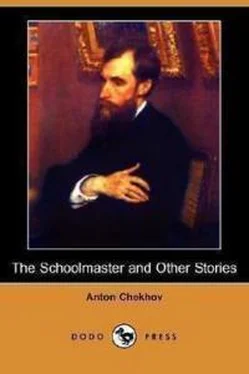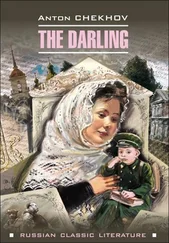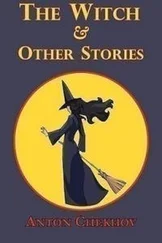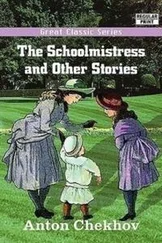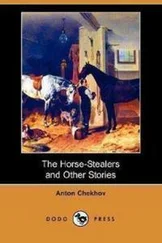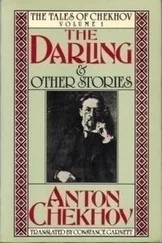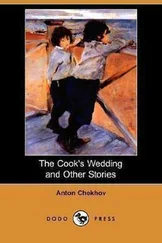The Schoolmaster
And Other Stories
Anton Chekhov
FYODOR LUKITCH SYSOEV, the master of the factory school maintained at the expense of the firm of Kulikin, was getting ready for the annual dinner. Every year after the school examination the board of managers gave a dinner at which the inspector of elementary schools, all who had conducted the examinations, and all the managers and foremen of the factory were present. In spite of their official character, these dinners were always good and lively, and the guests sat a long time over them; forgetting distinctions of rank and recalling only their meritorious labours, they ate till they were full, drank amicably, chattered till they were all hoarse and parted late in the evening, deafening the whole factory settlement with their singing and the sound of their kisses. Of such dinners Sysoev had taken part in thirteen, as he had been that number of years master of the factory school.
Now, getting ready for the fourteenth, he was trying to make himself look as festive and correct as possible. He had spent a whole hour brushing his new black suit, and spent almost as long in front of a looking–glass while he put on a fashionable shirt; the studs would not go into the button–holes, and this circumstance called forth a perfect storm of complaints, threats, and reproaches addressed to his wife.
His poor wife, bustling round him, wore herself out with her efforts. And indeed he, too, was exhausted in the end. When his polished boots were brought him from the kitchen he had not strength to pull them on. He had to lie down and have a drink of water.
"How weak you have grown!" sighed his wife. "You ought not to go to this dinner at all."
"No advice, please!" the schoolmaster cut her short angrily.
He was in a very bad temper, for he had been much displeased with the recent examinations. The examinations had gone off splendidly; all the boys of the senior division had gained certificates and prizes; both the managers of the factory and the government officials were pleased with the results; but that was not enough for the schoolmaster. He was vexed that Babkin, a boy who never made a mistake in writing, had made three mistakes in the dictation; Sergeyev, another boy, had been so excited that he could not remember seventeen times thirteen; the inspector, a young and inexperienced man, had chosen a difficult article for dictation, and Lyapunov, the master of a neighbouring school, whom the inspector had asked to dictate, had not behaved like "a good comrade"; but in dictating had, as it were, swallowed the words and had not pronounced them as written.
After pulling on his boots with the assistance of his wife, and looking at himself once more in the looking–glass, the schoolmaster took his gnarled stick and set off for the dinner. Just before the factory manager's house, where the festivity was to take place, he had a little mishap. He was taken with a violent fit of coughing …. He was so shaken by it that the cap flew off his head and the stick dropped out of his hand; and when the school inspector and the teachers, hearing his cough, ran out of the house, he was sitting on the bottom step, bathed in perspiration.
"Fyodor Lukitch, is that you?" said the inspector, surprised. "You …have come?"
"Why not?"
"You ought to be at home, my dear fellow. You are not at all well to–day…."
"I am just the same to–day as I was yesterday. And if my presence is not agreeable to you, I can go back."
"Oh, Fyodor Lukitch, you must not talk like that! Please come in. Why, the function is really in your honour, not ours. And we are delighted to see you. Of course we are! … "
Within, everything was ready for the banquet. In the big dining–room adorned with German oleographs and smelling of geraniums and varnish there were two tables, a larger one for the dinner and a smaller one for the hors–d'oeuvres. The hot light of midday faintly percolated through the lowered blinds…. The twilight of the room, the Swiss views on the blinds, the geraniums, the thin slices of sausage on the plates, all had a naïve, girlishly–sentimental air, and it was all in keeping with the master of the house, a good–natured little German with a round little stomach and affectionate, oily little eyes. Adolf Andreyitch Bruni (that was his name) was bustling round the table of hors–d'oeuvres as zealously as though it were a house on fire, filling up the wine–glasses, loading the plates, and trying in every way to please, to amuse, and to show his friendly feelings. He clapped people on the shoulder, looked into their eyes, chuckled, rubbed his hands, in fact was as ingratiating as a friendly dog.
"Whom do I behold? Fyodor Lukitch!" he said in a jerky voice, on seeing Sysoev. "How delightful! You have come in spite of your illness. Gentlemen, let me congratulate you, Fyodor Lukitch has come!"
The school–teachers were already crowding round the table and eating the hors–d'oeuvres. Sysoev frowned; he was displeased that his colleagues had begun to eat and drink without waiting for him. He noticed among them Lyapunov, the man who had dictated at the examination, and going up to him, began:
"It was not acting like a comrade! No, indeed! Gentlemanly people don't dictate like that!"
"Good Lord, you are still harping on it!" said Lyapunov, and he frowned. "Aren't you sick of it?"
"Yes, still harping on it! My Babkin has never made mistakes! I know why you dictated like that. You simply wanted my pupils to be floored, so that your school might seem better than mine. I know all about it! … "
"Why are you trying to get up a quarrel?" Lyapunov snarled. "Why the devil do you pester me?"
"Come, gentlemen," interposed the inspector, making a woebegone face. "Is it worth while to get so heated over a trifle? Three mistakes … not one mistake … does it matter?"
"Yes, it does matter. Babkin has never made mistakes."
"He won't leave off," Lyapunov went on, snorting angrily. "He takes advantage of his position as an invalid and worries us all to death. Well, sir, I am not going to consider your being ill."
"Let my illness alone!" cried Sysoev, angrily. "What is it to do with you? They all keep repeating it at me: illness! illness! illness! … As though I need your sympathy! Besides, where have you picked up the notion that I am ill? I was ill before the examinations, that's true, but now I have completely recovered, there is nothing left of it but weakness."
"You have regained your health, well, thank God," said the scripture teacher, Father Nikolay, a young priest in a foppish cinnamon–coloured cassock and trousers outside his boots. "You ought to rejoice, but you are irritable and so on."
"You are a nice one, too," Sysoev interrupted him. "Questions ought to be straightforward, clear, but you kept asking riddles. That's not the thing to do!"
By combined efforts they succeeded in soothing him and making him sit down to the table. He was a long time making up his mind what to drink, and pulling a wry face drank a wine–glass of some green liqueur; then he drew a bit of pie towards him, and sulkily picked out of the inside an egg with onion on it. At the first mouthful it seemed to him that there was no salt in it. He sprinkled salt on it and at once pushed it away as the pie was too salt.
At dinner Sysoev was seated between the inspector and Bruni. After the first course the toasts began, according to the old–established custom.
"I consider it my agreeable duty," the inspector began, "to propose a vote of thanks to the absent school wardens, Daniel Petrovitch and … and … and … "
"And Ivan Petrovitch," Bruni prompted him.
"And Ivan Petrovitch Kulikin, who grudge no expense for the school, and I propose to drink their health…."
Читать дальше
